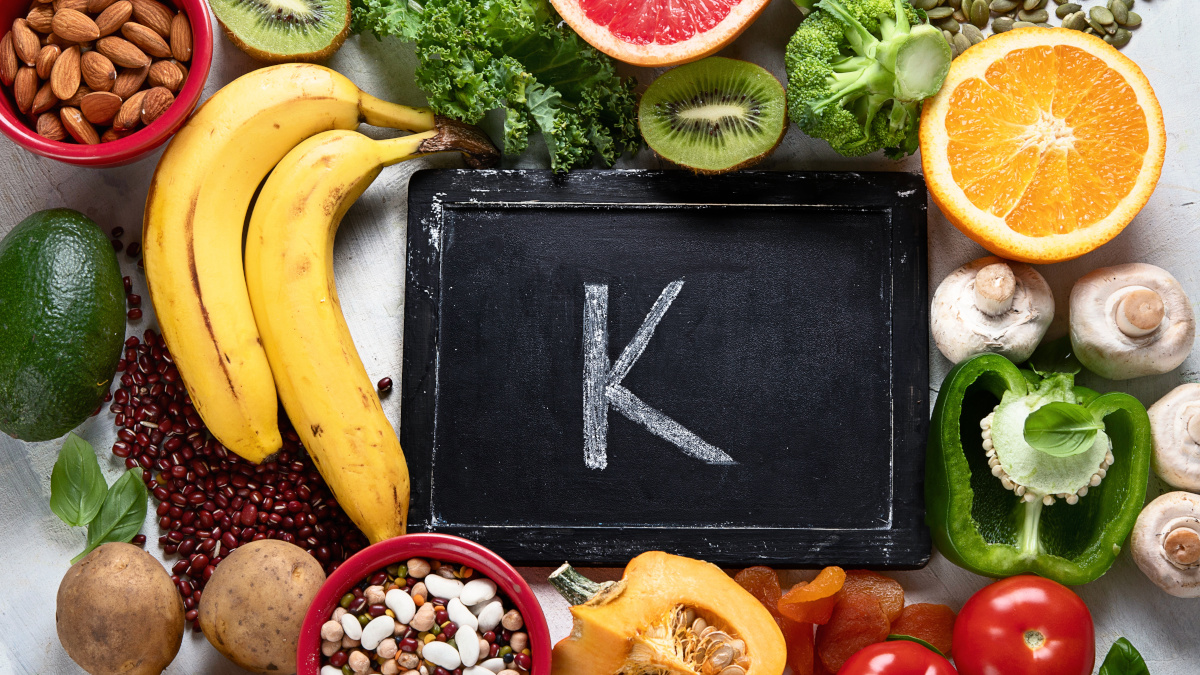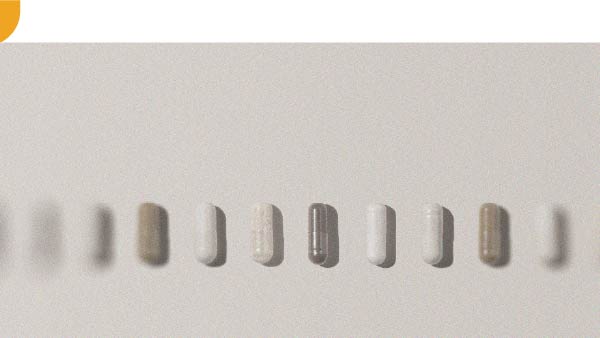Top 10 potassium-rich foods
Discover the top ten foods with the highest content of potassium, the mineral that supports normal nervous system and muscle function. Do you know which food takes the number 1 spot?

The health benefits of potassium
Potassium is a mineral with the symbol K for kalium (the medieval Latin for ‘potash’). It’s an electrolyte: it carries an electric charge when dissolved in the blood and other body fluids (1).
Potassium supports:
- normal function of the nervous system;
- normal muscle function;
- and normal blood pressure.
We obtain potassium from our diet (2).
Processed food and potassium deficiency
Modern diets, which often contain high levels of processed food, are low in potassium, potentially leading to deficiency (3). All the more so as the amount of potassium the body needs to function properly depends on the amount of sodium consumed. In other words: the more salt you eat, the greater your need for potassium. And as a rule, processed food is very high in salt … QED.
Thus potassium requirements vary between 2000mg and 8000mg a day depending on the amount of salt consumed.
It’s worth highlighting that people who are trying to shed fat and gain muscle mass, who are doing lot of sport and eating a substantial amount of dairy foods, can easily become deficient in potassium. Perspiration results in significant potassium loss, and at the same time, dairy products (especially cheese) are usually high in salt(4).
As an alkaline compound, this mineral is also a valuable aid for those following an acid-base balance diet. So without further ado, here are the top 10 potassium-rich foods!
10) Cured ham with 556mg of potassium per 100g
100g of cured ham provides almost 30% of the daily recommended intake for potassium. But take care not to eat excessive amounts, and make sure you choose ham which is nitrite- and nitrate-free, such as Parma ham.
9) Hazelnuts with 606mg of potassium per 100g
The queen of European nuts (along with the potassium-rich almond), the hazelnut constitutes an excellent food for curbing hunger: a 30g handful will easily satisfy an attack of the munchies! As well as their high potassium content, hazelnuts are also a great source of proteins and lipids.
8) Prunes with 657mg of potassium per 100g
Popular with sportspeople, particularly those who engage in endurance sports, prunes are veritable treasure troves of nutrients. High in calories but also in vitamins (E, B1, B2, B3, B5 and B6)… and, of course, potassium, they help maintain normalintestinal transit. In short – and especially if you suffer from constipation – eating 100g or so of prunes a day is a good way of increasing your potassium intake.
7) Peanut butter with 673mg of potassium per 100g
We’re staying with the high-calorie foods for a moment to move onto peanut butter, or more precisely, natural, additive-free peanut butter (not the American-type spreads). Like hazelnuts, peanuts are an excellent source of fats and protein, but they also contain a good level of potassium. As with any high-calorie food, moderation is key: just one or two tablespoons a day is enough to satisfy a hunger pang and help boost your potassium intake.
6) 72% dark chocolate with 700mg of potassium per 100g
You now have a good excuse to eat a few squares of dark chocolate every day: it’s a valuable source of potassium! What’s more, dark chocolate containing at least 72% cocoa is relativelylow in calories and contains protein, good fats and polyphenols.
5) Raisins with 773mg of potassium per 100g
Raisins provide 773mg of potassium per 100g. So you can vary your potassium-rich snacks throughout the week by alternating between a handful of hazelnuts, and one of raisins, etc.
4) Haricot beans with 1660mg of potassium per 100g
Snacks are all well and good but sometimes we need a nourishing food that can form the basis of a proper meal: haricot beans. These nutritious, high-protein, moderate-calorie pulses rank higher than all the previously-mentioned potassium sources with 1660mg per 100g.
3) Brewer’s yeast with 2460mg of potassium per 100g
Perfect for sprinkling on salads and soups, brewer’s yeast contains a high level of potassium with almost 2500mg per 100g. Of course it would be hard to consume 100g a day, but each spoonful takes you closer to your daily requirement for potassium.
2) Sundried tomatoes with 3430mg of potassium per 100g
They’re delicious, they add flavour to cooked dishes, salads, savoury tarts and other recipes ... Sun-dried tomatoes take second place on the podium, providing 3430mg of potassium per 100g. Fresh tomatoes too are an excellent source of potassium. So as soon as summer’s here, make sure you stock up on tomatoes.
1) Dried kombu seaweed … with a record 10,600mg of potassium per 100g
Dried kombu kelp (or seaweed) is the potassium record-breaker, with 10,600mg per 100g (6). As Asian cuisine has grown in popularity across the world, dried kombu has become more widely available and it can be used in many different ways in a variety of recipes ... But one of the simplest is to sprinkle a little on your dishes, like brewer’s yeast.
A few potassium supplements of interest
It’s worth adding here that dried dates, raw fennel, bananas, coconuts and dried apricots are also good dietary sources of potassium.
To increase your intake of this key mineral, you could also take a potassium supplement, such as the classic Potassium Orotate which provides 90mg per daily dose.
Less absorbable than the latter,potassium bicarbonate is generally included in supplements at a higher dose (the product Potassium Bicarbonate, for example, contains 2100mg of potassium per daily dose).
Given that potassium helps to maintain normal blood pressure, it also features in certain synergistic formulations. The supplement Tensix, for example, combines potassium, arginine and extract of hawthorn leaf, which supports good cardiovascular health.
If you want to obtain the benefits of several minerals from a single capsule, then try a mineral complex (such as MultiMineral Complex, rich in potassium, as well as magnesium, iodine, etc.)
References
- https://www.academie-medecine.fr/le-dictionnaire/index.php?q=potassium
- SKRABAL, F., AUBÖCK, T., et HORTNAGL, H. Low sodium/high potassium diet for prevention of hypertension: probable mechanisms of action. The Lancet, 1981, vol. 318, no 8252, p. 895-900.
- FREGLY, MELVIN J. Estimates of sodium and potassium intake. Annals of internal medicine, 1983, vol. 98, no 5_Part_2, p. 792-799.
- BIGARD, X. 6 Vitamines, minéraux, oligoéléments et sports. Nutrition du sportif, 2017, p. 139.
- EPPENDORFER, Wilfried H. et BILLE, Søren W. Free and total amino acid composition of edible parts of beans, kale, spinach, cauliflower and potatoes as influenced by nitrogen fertilisation and phosphorus and potassium deficiency. Journal of the Science of Food and Agriculture, 1996, vol. 71, no 4, p. 449-458.
- KOLB, Nada, VALLORANI, Luciana, MILANOVIĆ, Nada, et al.Evaluation of marine algae wakame (Undaria pinnatifida) and kombu (Laminaria digitata japonica) as food supplements. Food Technology and Biotechnology, 2004, vol. 42, no 1, p. 57-61.
3 Days
The delivery was fast and the product…
The delivery was fast and the product is great
SOMMARIVA Gianni
4 Days
Great service and lots of information
Great service and lots of information
Gabi
7 Days
Service Satisfaction
I’m satisfied with the service; it fulfilled what it set out to do.
Anfhony Abreu
10 Days
Original product and fast delivery
Original product and fast delivery. I haven't started it yet, but will do soon.
Vincenza Catania
13 Days
Good quality
Good quality. Good service.
Leonel Guzman
15 Days
Top!!!!!!!!
Top!!!!!!!!
Michael
17 Days
Excellent!
Products are great and delivered fast!
PARDINI Debora
18 Days
From order to receive the product
From order to receive the product, the process is smooth & fast. It’s good to customers.
WONG Mei Ling
19 Days
Fast delivery
very quick delivery to italy. product is good.
Customer
20 Days
Prompt delivry !!👍
Prompt delivry !!👍
SWEET Christine
20 Days
Good delivery and flawless quality
AS far as delivery and the visual quality are concerned, Supersmart is excellent. I will not comment on the efficacy of the products themselves, since that is only possible over a longer period and in a large customer base compared to people who do not consume a particular product.
Roger De Backer
21 Days
Perfect services
Perfect services, perfect support, great articles about products
Michaela Alali Beitlová
22 Days
Great experience and effective supplements
I’ve purchased many types of supplements from this company over the course of years to treat a few issues, and I’m satisfied with their quality. After using them consistently for a period of time, I can say they met my expectations and I could feel real health benefits that built up over time. Deliveries are always quick. I recommend this company to anyone looking for high-quality supplements.
Giordano
22 Days
Es hat alles gestimmt
Es hat alles gestimmt. Top
marina thieme
25 Days
Great product
Great product, but still evaluating its effectiveness. Highly recommended. Super efficient delivery.
Chalise
of experience
your money back
##montant## purchase



